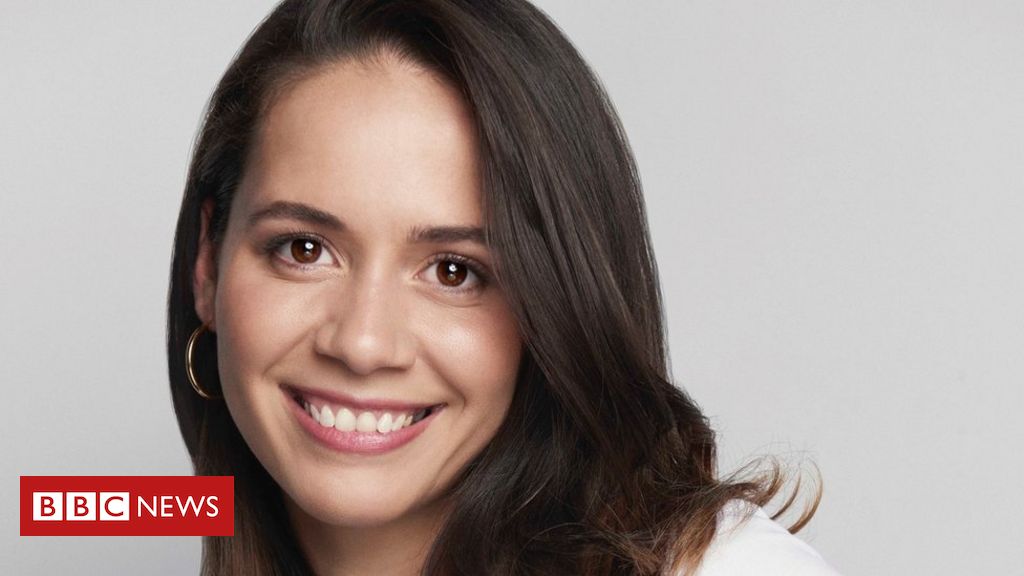The BBC’s weekly The Boss series profiles different business leaders from around the world. This week we speak to Jules Miller, founder of dietary supplements firm The Nue Co.
Jules Miller says she became so ill that she had internal bleeding.
“I was exhausted, bloated, I wasn’t living a normal life anymore. That’s when I started to think about food, wellness and supplements.”
This was back in 2015. Living a stressful life in London, Jules, then aged 25, had been diagnosed with irritable bowel syndrome (IBS).
She started taking supplements to try to alleviate the problem, but found that nothing worked. She says that some even made her feel worse, and she was alarmed that most of the pills she tried were full of fillers and bulking agents.
At this stage many of us in her predicament may have got depressed, worried or angry, but Jules had a secret weapon – her grandfather was a chemist at the University of Cambridge. So with her granddad – the late Prof George Miller – she started to research dietary supplement formulations and ingredients.
“It was a great insight,” says Jules, now 31. “There were brands out there that were supposed to help you, but they contained ingredients that were clinically proven to bring on other symptoms.”
Her work with her grandfather inspired Jules to start her own all-natural supplements business. And in 2017 she launched Nue. Today the business has annual revenues of $10m (£7.8m). Jules says that so far this year sales have soared six-fold compared with 2019, which she puts down to more people being concerned about their underlying health in the face of the coronavirus pandemic.
Half-Colombian, Jules was born in London, but her family moved to the South American country when she was a few months old. Spanish is her first language. She returned to the UK capital with her parents when she was seven.
After school she studied philosophy at Birmingham University, before working in advertising in London. Prior to launching Nue she was head of business development for vegetarian food firm Detox Kitchen. Looking back at when she started Nue, Jules says she was fearless.
“I think if I launched another business now I wouldn’t have the confidence I had then,” she says. “I was so cocky. I wrote down a list of things I didn’t know, and individuals who might have the answer, and I emailed them.
Two people she contacted were Natalie Massenet, the founder of fashion retailer Net-a-Porter, and Harvey Spevak, the boss of US fitness firm Equinox. Luckily for Jules both replied, and they offered her advice.
Nue’s initial product was called Debloat, a supplement to alleviate IBS that Jules found worked for her. Other items then followed, such as vitamins and, more recently, skin treatments. The company was based in Cambridge to begin with, but within its first year of trading it relocated to New York. Jules says this was to allow it to better take advantage of the fact that the US is the largest market for dietary supplements.
“Some 80% of Americans are taking vitamins or another supplement, yet Brits are less open to it.”
Globally the supplements sector is booming, with a report last year saying it was expected to see annual sales rise to $210bn (£160bn) by 2026, up from $125bn (£95bn) in 2018.
Nue started out in 2017 by selling via its website, but its products are now stocked by a number of retailers, and it has one shop of its own, in New York.
The business has now secured $11.5m in funding in total, including from consumer goods giant Unilever, but Jules and her husband Charlie Gower remain the largest shareholders. He also holds the chief operating officer job, while Jules is the chief executive.
Caroline Peyton, a British nutritional therapist, says it is good that the company talks about exactly what goes into its products.
“Few people understand what goes into their supplements other than the nutritional ingredients they are looking for,” she says. “Having great clarity about this is a good thing for the industry. There will always be a market for lower cost products, but some people value paying a bit more for purity.”
But how necessary are dietary supplements? In the UK the National Health Service advises taking vitamin D tablets if you are not getting exposed to enough sunlight. This is because our bodies create vitamin D when our skin is exposed to sunshine.
Yet for most other vitamins and minerals, isn’t it all about eating a good diet?
More The Boss features:
A spokeswoman for the British Nutrition Foundation said: “In general, eating a balanced and varied diet should provide sufficient amounts of the vitamins, minerals and other nutrients that we need, as well as important dietary components such as fibre, and natural bioactive compounds, such as polyphenols, without the need for supplements. And supplements should not be used as a substitute for a healthy diet.
“There are though, importantly, some cases where supplementation is recommended, such as taking a folic acid supplement during pre-conception and early pregnancy.”
Jules says it is all about finding out what supplements work for you.
Nue also ran a campaign last year urging people to be mindful of their mental health. Called “How are you really?” it talked about how the wider wellness sector was guilty of focusing solely on people’s physical wellbeing.
“We want people to listen to their bodies, as everyone’s journey, like mine, is personal,” says Jules.
Looking ahead, she adds that new products are in development. “We want to continue with the conversations that matter, around beauty, wellness, and, of course, mental health.”

